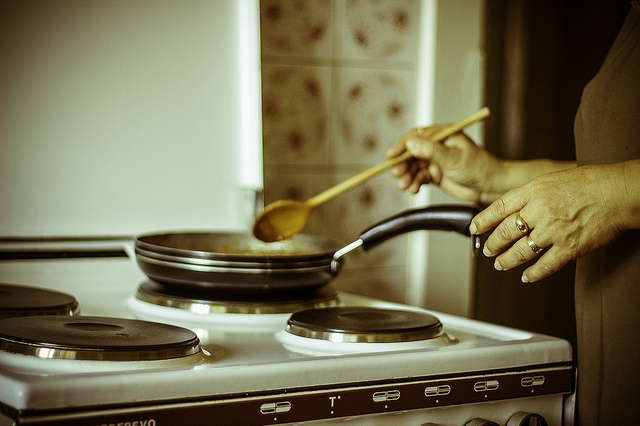
For decades, experts suggested vegetable oils were best to cook with, yet now we hear cooking with butter or coconut oil is healthiest. No wonder we’re so confused!
For instance, the American Heart Association (AHA) recommends adults get no more than five percent of their calories from saturated fat, urging people to use vegetable oils instead.
They also advise people to eat at least 5 to 10 percent of their calories from polyunsaturated fat (PUFAs). Unlike saturated fat, the AHA rationalizes that PUFAs lower LDL cholesterol levels.
As a result of this and other poor nutrition advice, Americans consume at least twice the amount of omega-6s today than they did in the 1960s.
More omega-6 vegetable oils mean we under-consume omega-3 fats, increasing cardiovascular disease, Type 2 diabetes, obesity, pre-diabetes, IBS, arthritis, asthma, cancer, autoimmune diseases, and other issues.
That’s because omega-6 fats fuel our body’s inflammatory pathways and counteract the benefits and availability of anti-inflammatory omega-3 fats, creating even more inflammation.
These ubiquitous omega-6 fats like vegetable oils also undo any health benefits omega-3 fats provide. They reduce the conversion of plant-based omega-3 fats (called alpha-linolenic acid, or ALA) into active forms of omega-3s (called eicosapentaenoic acid and docosahexaenoic acid or EPA and DHA) by about 40 percent.
Consuming too many omega-6 fats also increases mental illness, suicide, and even homicide. In fact, studies show a connection between increased omega 6s, mental health, and inflammation.
We need to eliminate these highly processed vegetable oils and eat more plant-based and animal fats such as butter, coconut oil, and even lard. Based on that information, let’s look more closely at our best cooking choices.
For one, we want to eliminate refined oils except extra-virgin olive oil.
When cooking, we want to use extra-virgin coconut oil, avocado oil (both of which can be used at higher temperatures because these are highly stable oils), and even ghee (clarified butter).
Ghee has a higher smoking point at 400˚to 500˚F and provides the same nutrients in grass-fed butter, like cancer-fighting conjugated linoleic acid (CLA). Ghee and butter are also high in vitamins D and A, omega-3 fats, and butyric acid, which can boost immunity and help inflammation as well as protect against colon cancer.
Coconut oil tolerates temperatures up to about 350˚, so it’s great for most baking and medium-high heat sautéing. Olive oil is best for low-heat cooking or used raw for dressing salads. Avocado oil, macadamia oil, and walnut oil also are wonderful raw and make great dressings.
We should always go for organic, unrefined, cold-pressed, or expeller pressed oils. Do research and don’t be afraid to contact the company directly to ensure the product is truly cold-pressed. Organic production prohibits GMOs and the use of hexanes for extraction in oils.
Storage and shelf life become crucial with cooking oils. Store oils in dark, not clear, bottles and keep in a cool, dark place away from light and heat. Don’t store oils on kitchen counters or next to the stove. Always close the lid tightly and immediately store oils after using them because oxygen contributes to rancidity.
Oils go bad over a span of months depending on the type. I recommend only purchasing the amount we can actually use within two months.
To further learn how to cook with healthy fats and which fats to choose, my new cookbook, Eat Fat, Get Thin Cookbook, contains over 175 delicious healthy fat recipes.
What are your go-to oils? Do you steer clear of vegetable oils now that you know they’re unhealthy? Share your thoughts below on my Facebook page.
Author: Dr. Mark Hyman
Image: Marjan Lazarevski/Flickr; Pexels
Editor: Emily Bartran
 Share on bsky
Share on bsky





Read 0 comments and reply